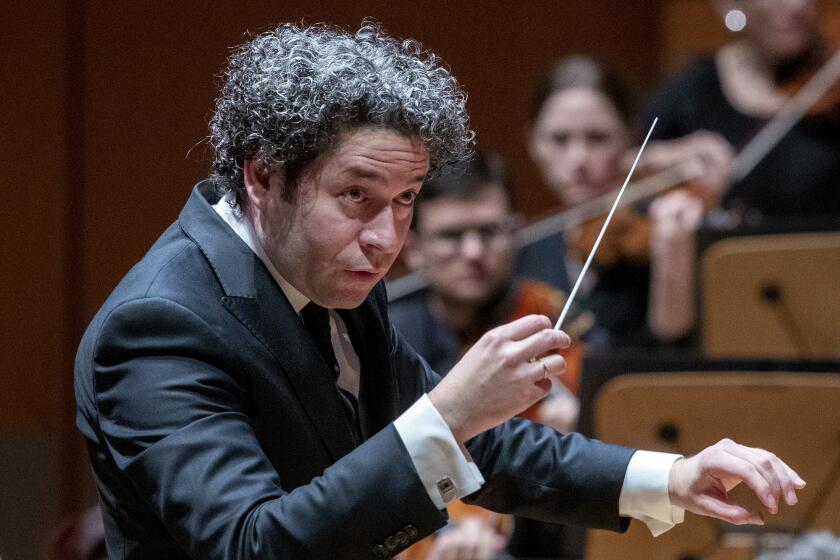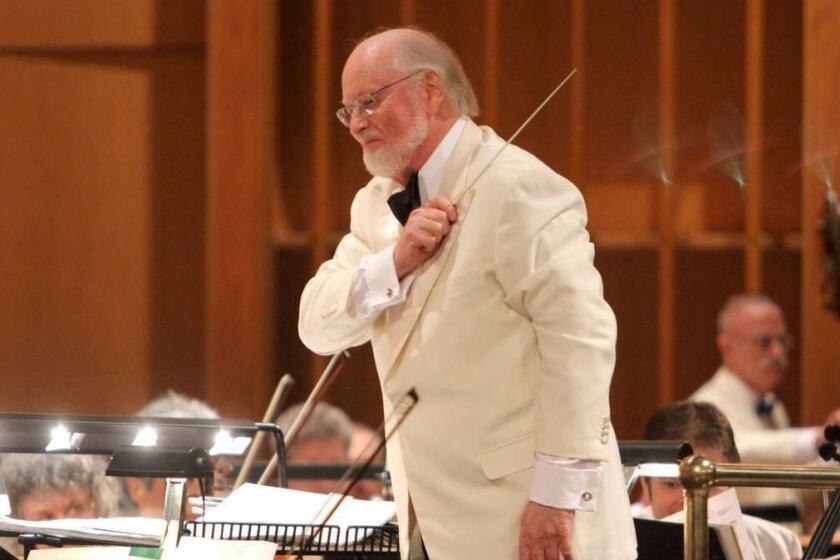Look out, New York. This is what an L.A. summer week looks like for Gustavo Dudamel
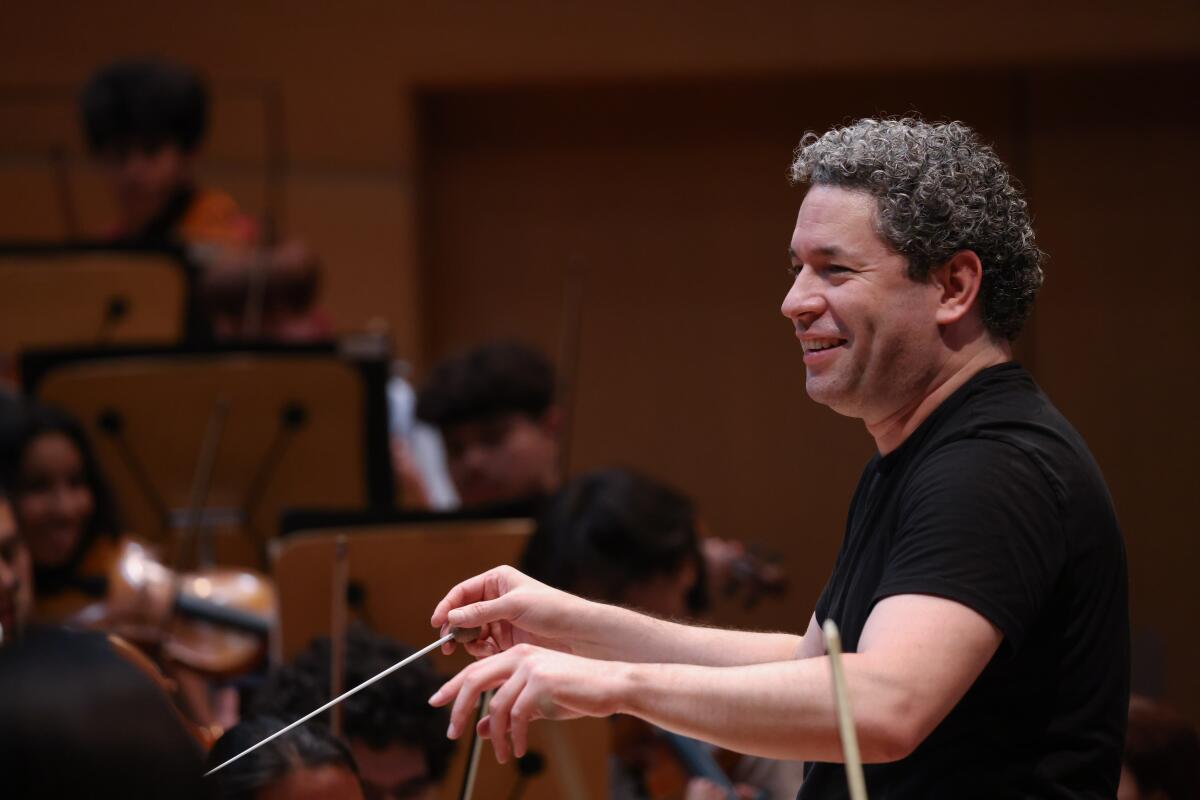
- Share via
Gustavo Dudamel’s Hollywood Bowl commitment seems unusually short this year. It ends Saturday, a little more than two weeks after having opened the Los Angeles Philharmonic summer season. He won’t be back until October, when he inaugurates the orchestra’s fall season with a celebration of Frank Gehry and the 20th anniversary of Walt Disney Concert Hall.
This has led to inevitable concern that one of our most prized cultural figures may already have a foot out his L.A. door, despite the fact that he remains the L.A. Phil music and artistic director for another three full seasons before heading to the New York Philharmonic.
But short may be the wrong descriptor for Dudamel’s summer appearances here. Condensed seems more like it. Over a seven-day period last week, Sunday through Saturday, he conducted three different Bowl programs, with a wide range of music that included everything from John Williams film scores to Broadway show tunes to Verdi’s operatic Requiem. He worked with the YOLA National Chamber Orchestra and YOLA National Symphony Orchestra, a workshop for 170 talented music students between the ages of 12 and 18 from around the country. That culminated in a concert in which he not only conducted but also made a surprise appearance joining in the violin section.
The announcement of Gustavo Dudamel’s 2026 move to New York prompts reflection on his work with the L.A. Philharmonic. A story gallery.
All told Dudamel conducted and or/rehearsed more than two dozen separate works, large (the Verdi Requiem is 90 minutes), medium and small. He tirelessly embraced film music, quasi-opera, symphony, jazz, ballet and the American songbook. The best of it had an only-in-L.A. vibe, one not readily transported to New York.
For Williams’ annual Bowl program, the composer and his movies were clearly the main attraction. Dudamel conducted the first half as a kind of high-profile opener for the composer, who led the second. When the 91-year-old Williams walked on stage after intermission, the audience of “Star Wars” fans who filled the 18,000-seat amphitheater shouted, over and over and from all sections, “We love you!”
Dudamel, of course, shared in the lovefest. He has championed Williams from his first days in L.A., and no one has ever conducted Williams’ scores with greater sophistication, conviction or sheer flair. Dudamel told the audience that when Williams invited him to conduct the opening and closing music for the soundtrack of “The Force Awakens,” he felt like “the most blessed person on the planet.”
John Williams is synonymous with Hollywood.
Much of Dudamel’s program went intriguingly off the beaten track, turning to “The Cowboys” and “Amistad.” He also added, he said at Williams’ request, Bernard Herrmann’s “Scene d’Amour” from Alfred Hitchcock’s “Vertigo.”
For his part, Williams stuck mostly to his hits. During his last encore, “The Imperial March” from “The Empire Strikes Back,” Dudamel crept on stage, mounted the podium and pulled a lightsaber out of his jacket pocket, conducting with it and deposing Williams. A violist handed Williams a saber, and the composer challenged the upstart Darth Vader. In the end, they conducted side-by-side with their sabers not always going in the same direction, the orchestra excitedly continuing to follow Dudamel. Williams then gave Dudamel a big hug.
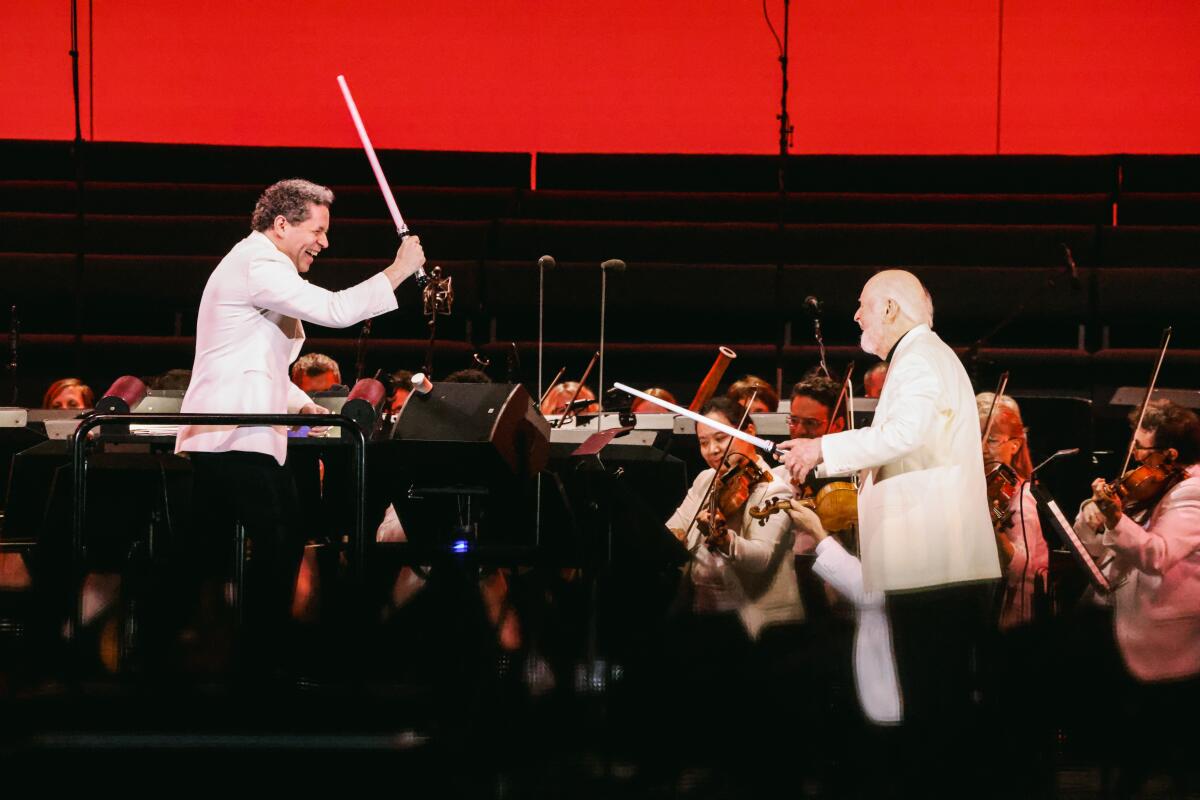
Dudamel and Williams have happily shared the stage many times, but this was their first time together at the Bowl, where each had made his historic L.A. Phil debut — Williams in 1978 and Dudamel in 2005. It was one more for the Bowl’s books.
The performances of both Verdi’s Requiem and of an Ellington/Gershwin program had different kinds of significance. When Dudamel first conducted the Requiem at the Bowl, 10 summers ago, it was an event, given twice, filmed for broadcast on PBS and released as a DVD. The then 32-year-old conductor led a concert performance of Verdi’s “Aida” same week.
Review: Dudamel wondrously plays down Verdi’s Requiem at the Bowl
This summer, Dudamel programmed no opera and nothing on the scale of Yuval Sharon’s video-enhanced staging of Wagner’s “Die Walküre” last summer. The closest thing, a staging of Mendelssohn’s incidental music to “A Midsummer Night’s Dream,” was canceled last minute for supposed scheduling difficulties.
But if Verdi’s Requiem was treated as business as usual, it nevertheless is operatic and grand. Dudamel has become more reflective and less showy over the past decade, and while he maintained much of the dramatic vitality in Verdi’s score, this Requiem’s intensity proved as spiritual as theatrical.
Maybe letting the music speak for itself explains something about Dudamel’s evolving musical needs. No matter the reason, the Requiem was probing and powerful, with excellent soloists — soprano Leah Hawkins, mezzo-soprano Rihab Chaieb, tenor Mario Chang and bass-baritone Ryan Speedo Green — and the Los Angeles Master Chorale.
Last Thursday night, Dudamel turned to two impressive Duke Ellington symphonic works: “Three Black Kings” and “Night Creature.” The L.A. Phil was juiced up with extra saxophones, brass and percussion. These Ellington scores tend to suffer from a symphony orchestra’s failure to swing. But as with Williams’ music, Dudamel remains in a class unto himself in this repertoire.
He ended with Gershwin’s “An American in Paris.” Is it fair to read in a somewhat wistful performance, the feelings of an American no longer in Paris, Dudamel having suddenly and suprisingly resigned his post as music director of Paris Opera? The taxi horns honked as they should. There was lovely atmosphere and the sweet lyricism of love, along with the aural equivalent of warm morning croissants and strong coffee. It felt — and movingly so — like a happy-sad homesick expatriate’s Paris.
In all of these Bowl appearances, Dudamel maintained an exalted level of music-making under difficult circumstances, which this year has included noisy aerial flyovers during concerts; creepy, loud drones lately add to the squadron of small aircrafts and obnoxious helicopters. No L.A. Phil music director has come close to embracing the Bowl the way Dudamel does, but something seemed ever so slightly different, perhaps an ambivalent acknowledgment that his future lies elsewhere.
That seemed the case when Broadway and singer and actress Patina Miller jointed the Ellington/Gershwin program. Dudamel is known to be an exuberant champion of Broadway when it comes to conducting Leonard Bernstein (he does a great “West Side Story”) and Steven Sondheim. But there wasn’t much he could do with Miller’s formulaic, if polished, Broadway approach to Ellington’s “It Don’t Mean a Thing,” Gershwin’s “I Got Rhythm” and other classics. Like a respectful tourist, Dudamel dutifully stayed out of the way.
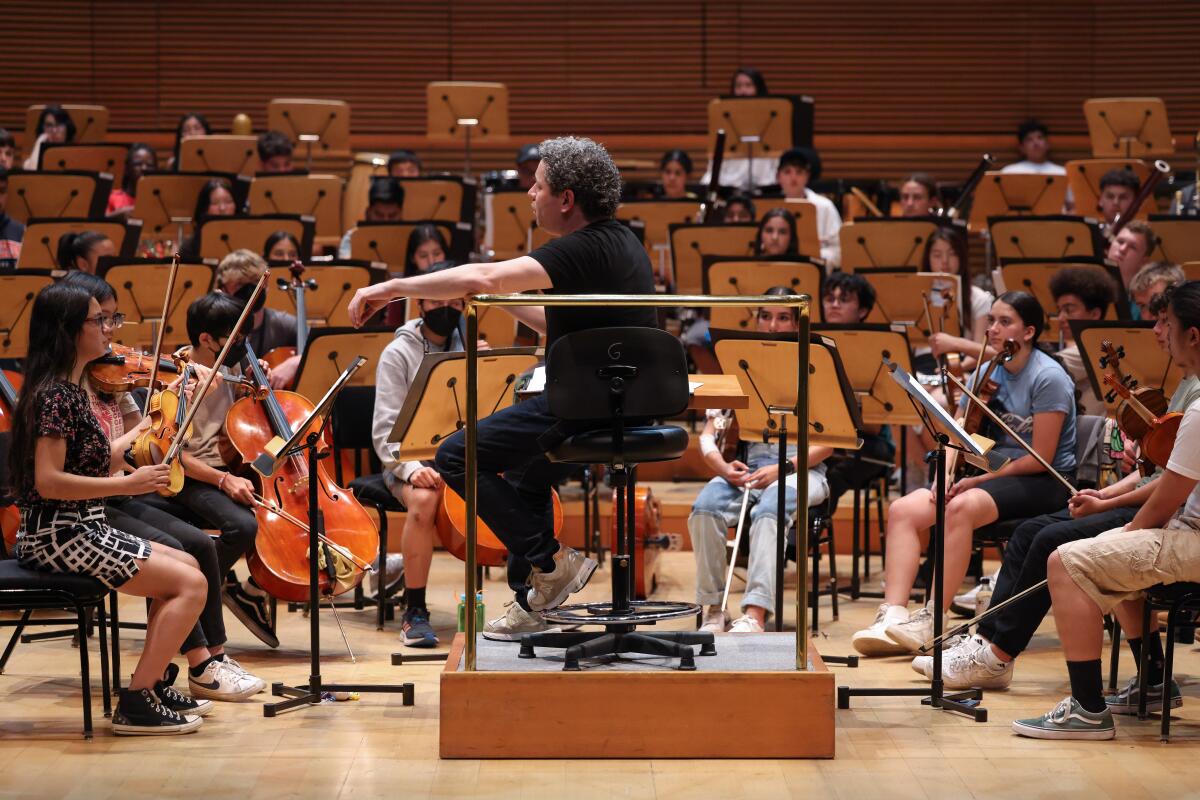
Yet when he walked on stage the next afternoon at Disney Hall to rehearse the YOLA National in Verdi’s overture to “La Forza del Destino” and the last movement of Tchaikovsky’s Fourth Symphony, he appeared fully at home.
The orchestra was big — around 170 strong. And loud. And excitable. Dudamel exuded energy. Working on “Forza,” he asked the players to discover where tenderness comes from. Turning to Tchaikovsky, he exalted in the many levels of dynamics and arresting speed.
“When you are young,” Dudamel, wearing the same blue YOLA T-shirt that players sported, explained to the audience at the public concert the next evening, “the orchestra becomes a place where you understand the meaning of harmony and connection on the highest level.
“My dream as a boy in Barquisimeto,” he said of his hometown in Venezuela, “was to play music with my friends, not to conduct the most famous orchestras. You are all my young friends in Barquisimeto.”
The program began with four works played by YOLA National Chamber Orchestra (yet nearly as big as a regular symphony orchestra) made up of the youngest players, conducted by LaSaundra Booth, a University of North Carolina music educator. The last was Arturo Márquez’s “Danzón No. 2,” one of Dudamel’s signature pieces, and for it Dudamel joined the first violins, cheerfully sawing away in the back of the section and looking as though there were no place he’d rather be.
After intermission one of Dudamel’s old friends from Venezuela, Andrés González, conducted the gigantic YOLA National Symphony in selections from Margaret Bonds’ “Montgomery Variations” and Silvester Revueltas’ “Sensemayá.” Both were forceful and gripping.
The results that Dudamel got from his Verdi and Tchaikovsky, though, were beyond belief. Close your eyes and you’d never know that this might be a diverse collection of kids from 28 states and one U.S. territory, from a wide range of backgrounds, who had only been playing together for about a week.
That they sounded professional was the least of it. They radiated joy. They brought life to their every utterance. A full house hung on every measure of the scores. The pride on Dudamel’s face couldn’t be missed. By every meaningful criterion, these were great performances.
YOLA, which was Dudamel’s initiative, is the result of years of caring development and generous funding. New York has but three years to get a similar program underway. It can’t wait another second if it wants to hire the 94-year-old Frank Gehry to begin converting an old bank building or warehouse into a concert hall and teaching center, as he has brilliantly done for YOLA in Inglewood. He already has plans for others around L.A. and the world.
There is also the name to consider. YOLA has a resounding hurrah. But YONY?
Or YONYC? Not with Yannick Nézet-Séguin as music director of the Metropolitan Opera, the New York Philharmonic’s next-door neighbor.
More to Read
The biggest entertainment stories
Get our big stories about Hollywood, film, television, music, arts, culture and more right in your inbox as soon as they publish.
You may occasionally receive promotional content from the Los Angeles Times.

